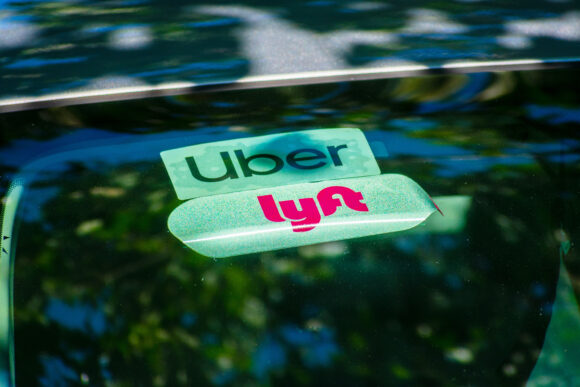Georgia lawmakers this year put an end to direct-action lawsuits against trucking companies’ insurers, but that did not come soon enough to bar litigation brought by people involved in accidents with ride-sharing services.
The Georgia Court of Appeals this week found that the ride-sharing service Lyft is considered a motor carrier under the wording of a 2015 statute. That means that a motorist injured by a Lyft driver can sue the Lyft driver’s insurance company, which in this case is State Farm Fire and Casualty Co.
“Because State Farm has not met its burden of proving that Lyft is exempt from the Georgia Motor Carrier Act’s definition of motor carrier, it was proper for Barnes to directly name State Farm in her lawsuit. We therefore reverse the trial court’s decision,” the appeals court’s third division wrote in the Aug. 26 opinion.
 Aundray Barnes was involved in a collision with Lyft driver Rome Leite-Brown in 2020. Barnes sued the driver, Lyft and State Farm, arguing that Lyft is a motor carrier, similar to a trucking company.
Aundray Barnes was involved in a collision with Lyft driver Rome Leite-Brown in 2020. Barnes sued the driver, Lyft and State Farm, arguing that Lyft is a motor carrier, similar to a trucking company.
At the time, Georgia was one of four states that allowed direct-action lawsuits against trucking firms’ insurance carriers. The rationale behind the 1937 law was that truckers could often not be found to be served with lawsuits, and may have had few assets that could be used to pay damages.
In recent years, though, those direct lawsuits have been blamed for soaring insurance premiums for truckers. One state official said the litigation had “destroyed our market,” especially for mom-and-pop trucking companies.
In March, the Georgia General Assembly gave almost unanimous approval to a change in the statutes. Senate Bill 426, now law, allows direct-action civil suits against insurers only when the trucking company has gone bankrupt or on the rare occasion when a driver cannot be located. Supporters hailed it as a way to encourage more insurers to write trucking lines in the state and bring down premiums.
But the law is not retroactive and does not cover the 2020 Lyft accident. Still, State Farm attorneys have argued that the previous law, written in 2015 to help govern the burgeoning world of Uber and Lyft, exempts ride-sharing services from the definition of “motor carriers.” Ride-share networks are governed by only one part of Georgia’s Motor Carrier Act, not another part, State Farm contends.
The trial court agreed with the insurance carrier and held that Lyft is not a motor carrier. But the appeals court judges strongly disagreed, noting that the different sections of the statutes have to be considered as a whole. Lawmakers specifically exempted taxicabs and limousines from the definition of motor carriers, but they did not include ride-sharing services in that exemption, appeals court Judge Kenneth Hodges III wrote for the panel.
The language of the statute “does not declare that ride share network services are not motor carriers as defined by OCGA § 40-1-100 (12) (A) of the Georgia Motor Carrier Act, nor does it exempt such companies from the Act’s definition of motor carrier,” Hodges explained. “It simply preempts the field of administration and regulation for certain types of transportation services to the extent that the rules are different from other portions of the Motor Carrier Act, as the General Assembly did for limousine carriers in Part 3 of the Act.”
The fact that some of the standards spelled out in the statutes differ from each other is not dispositive. “It is implausible that the General Assembly would have allowed ride share network services to remain operational under no public safety standards,” the appeals court noted.
It’s clear that lawmakers intended for regulations in different parts of the law to coexist and be applied together, the judges said. The legislative branch chose to exempt certain taxis and limousines from the motor carrier definition but did not exempt ride share networks from the definition.
If the General Assembly had wanted to exempt ride share network services like Lyft from the definition of motor carrier, it could have included those services in the list of exemptions in OCGA§ 40-1-100 (12) (B), as it did for certain taxicabs and limousines, the court said.
“This suggests that the General Assembly intended for the Motor Carrier Act to be read as a whole, with specific regulations applicable to certain transportation carriers, and general regulations applicable to all motor carriers,” the opinion reads.
State Farm lawyers had argued that the interpretation will unfairly put Lyft and Uber in a different category from taxis.
“While State Farm correctly asserts that our decision will subject ride share network services like Lyft to laws from which other transportation service providers, such as certain taxicabs and limousines, are expressly exempt, such as permitting a plaintiff to directly sue a ride share network service’s liability insurer, this Court cannot read new exceptions into a statute which has already clearly enumerated its exceptions,” the opinion notes.
The court noted that other states have put ride sharers in the same boat as other for-hire transport services. In 2016, a California court rejected the argument that Uber was only a broker of transportation services.
The court ruling did not explain how many other pending accident suits may be affected by the ruling. State Farm could not be reached for comment Wednesday.
Topics Lawsuits Carriers Georgia Trucking Sharing Economy Ridesharing State Farm
Was this article valuable?
Here are more articles you may enjoy.



 Uber Jury Awards $8.5 Million Damages in Sexual Assault Case
Uber Jury Awards $8.5 Million Damages in Sexual Assault Case  AIG Underwriting Income Up 48% in Q4 on North America Commercial
AIG Underwriting Income Up 48% in Q4 on North America Commercial  Allstate CEO Wilson Takes on Affordability Issue During Earnings Call
Allstate CEO Wilson Takes on Affordability Issue During Earnings Call  BMW Recalls Hundreds of Thousands of Cars Over Fire Risk
BMW Recalls Hundreds of Thousands of Cars Over Fire Risk 


